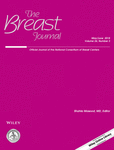Efficacy of anthracycline/taxane-based neo-adjuvant chemotherapy on triple-negative breast cancer in BRCA1/BRCA2 mutation carriers
Funding Information
The French national cohort, GENEPSO, was supported by a grant from the Fondation de France and the Ligue Nationale Contre le Cancer, and is currently supported by a grant from INCa as part of the European ERA-NET program on Translational Cancer Research (TRANSCAN-JTC2012, n°2014-008). This study was also supported by the “Canceropole du Grand Est” foundation.
[Correction added on October 13, 2017, after first online publication: Figure 2 was updated.]
Abstract
This study aims to estimate the pathologic complete response (pCR) rate after neo-adjuvant chemotherapy and to compare disease-free survival (DFS) and overall survival (OS) between pCR and non-pCR groups of patients with triple-negative breast cancer (TNBC) and deleterious BRCA1 or BRCA2 mutation. We carried out a retrospective analysis of 53 patients including 46 BRCA1, 6 BRCA2, and 1 combined BRCA1 and BRCA2 mutation. All patients had been diagnosed with triple-negative breast cancer (TNBC) between 1997 and 2014. Neo-adjuvant therapy consisted of regimens that were based on anthracycline or an anthracycline-taxane doublet. DFS included any relapse or second cancer. The Kaplan-Meier method and the log-rank test were used to compare pCR and non-pCR groups. A pCR was observed in 23 (42.6% [95% CI, 29.2%-56.8%]) of the TNBC included. The pCR rate was 38.3% [95% CI, 26%-55%] among BRCA1 mutation carriers, and 66% among the 6 BRCA2 mutation carriers. Median follow-up was 4.4 years (range 0.62-16.2 years) and did not differ between the groups (P = .25). Fifteen relapses and six second cancers were recorded during the follow-up period. Eleven deaths occurred, all of which were in the non-pCR group. DFS (P < .01) and OS (P < .01) were significantly better in the pCR group than the non-pCR group. This study shows a high pCR rate after neo-adjuvant therapy in BRCA-mutated triple-negative breast cancer, and the survival results confirm the prognostic value of pCR in this group. These outcomes should be considered as a basis of comparison to be used by future studies about new therapies in this domain.




